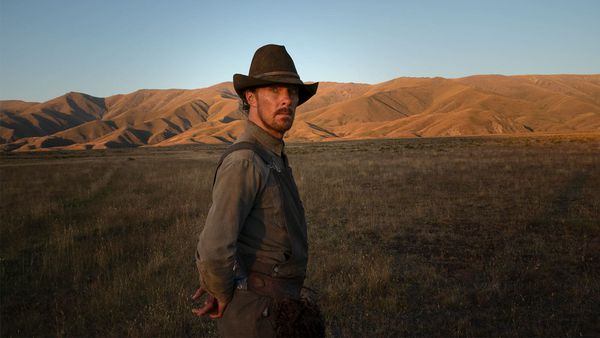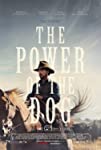Eye For Film >> Movies >> The Power Of The Dog (2021) Film Review
The Power Of The Dog
Reviewed by: Andrew Robertson

Books are not films, of course. This is an opportunity to nod sagely, of course, of course. It is one of the reasons why we have different words for these things, that they are different things to have words for. Films, too, are not books, for reasons not dissimilar.
Time and again, however, some seek to make from one the other. I have, somewhere in the collection of texts read and unread, a small stack of novelisations of films based on literary work. There is, for example, Bram Stoker's Dracula, and beside it like another box of earth is Fred Saberhagen's James V Hart's Francis Ford Coppola's Bram Stoker's Dracula. Which of those is gothic? Which of those is arch? Some 24 weeks and the small business of three billion seconds and change are not the only things that separate the two.

I find myself thinking about time because of The Power Of The Dog, of the changes made. Not, though, that books are actually made into films, at least, not properly. Inside them is theme, weight, feel, story. Through processes arcane they are ground out, the wheat and the chaff don't convey the alchemical magic. At some point we might infer an unalloyed story, plot at the front, spoiler at the back, ready to carry us. This is an impossible distillate, an idea that at its purest is still held in a meat of thought and the spark of genius, one neuron or another patiently pulsing at the next or the one after that. That which was on the page becomes that which is on the screen, the proximate is made distant, posture changes, but there is still an act of seeing, of decoding. The marrow of its bones becomes blood in its waters, one slow drop and drip at a time.
I find myself thinking about time because the novel is from nineteen and sixty-seven, set in the set of inter war years we call the inter-war years, on the unvarnished but smoothed edge of what had been the Wilder West. In the text there are any number of details that make it to the film, but outwith that there is one added by film. The brothers Burbank have two years between them in the pages of Thomas Savage's work. The younger George, Jesse Plemons, the older Phil, Benedict Cumberbatch, and between them twelve years. It adds a cast, a flavour.
There are many more elisions and efficiencies, but that gap in age is a change that brings profits. The novel has chapter (and verse, if you will) about their experiences at college. The younger George waiting with clean shoes and new clothes for a door that will not open has a different weight in text with outlined before and after. From Alpha to Omega to Phi Beta Kappa and that heavy word 'fraternity' around the meat and catered potatoes of 'pledge'. When there is a character called 'Alma' one is minded to the Latin whichever closer creed is granted lip-service at the Burbank ranch and the addition of an "in loco" even by implicature parentis is a neat one.
Other sets of fathers and sons are abridged. Some not without discomfort too, there is one cart here, not two. The ends are the same, between them, but the journey is not. There is within the novel a sum of 30 dollars. A reference to silver coins of that denomination brings a further question. In the novel one cart is the son of the Chief, and his son, away from the reservation to see lands now behind a Burbank fence. The other is a father and son of a different tribe, if you will, the anti-Semitism of the era a further undercurrent in a situation complicated enough.
Some dinners are reduced. Asides and diversions and visits to hotels are left by the wayside, not so much removal as erosion. The paths are still clear, worn, we do not need to see the feet for the dust they carry with them. Familial and political both not so much reduced as more tightly focused. You can repeat and you can reveal, and sometimes you can do both.
The title is from Psalms 22. In the novel it is given from the Book of Common Prayer, "Deliver my soul from the sword : my darling from the power of the dog." The text is as King James would version it, but you may mark the opening of it better. "My God, my God, why have you forsaken me?"
The dog has power, of various kinds. Even to those forsaken. There is a hill with multiple meanings, even (in the novel at least) three different sets of eyes that look upon it differently. Golgotha it is not, but what Phil sees, what George sees, are not the same. Thieves and martyrs in unequal numbers. There are other powers, some differently loco. The motive force of the cattle trains is called 'the power', moments in town where it is awaited after dusty drive and drouthy drovers. Mail-post and telegram, Victrola and Sears-Roebuck, the letters crafted are saved from cliché by their irregularity, stereotypes might be reached from another case but bit by bit these are new assemblages.
Among them Kirsten Dunst, Rose Gordon, mother to Peter, the angular frame of Kodi Smit-McPhee. She proprietor of a rooming house, a widow, later again a wife. He a creature long of limb and short of words, clad in jeans unbroken and unwashed, tennis shoes as white as salt or bone. We are given backstory by implication, a picture may be worth a thousand words at some exchanges but at frames per second the paragraphs slice by like the tip of a cracking whip.
The various encodings are stiffnesses, tics, stumblings, Cumberbatch's accent is affect, but deliberately so. There are opportunities for misreadings less clear than photographs on the magazine page and unkind musical notes. Across it though a weight, a tone, an opportunity to see a shape in the curve of hillside that reveals something else.
Jane Campion adapts, directs. It is silly to say that once again it is a West that is not 'the West', an adaptation of a novel, those obvious keys of analysis one or two or eighty-eight at a time. You can't spell Campion without 'piano', but things are never so black and white.
Gorgeous though. Ari Wegner has only a few features but for True History Of The Kelly Gang alone has earned credit enough that I will watch where she is pointed. Tiny Thomasin McKenzie has a small role here but her delicacy as Lola forms a chord with Dunst's Rose, stuck in this arrangement. Jonny Greenwood's score for Spencer alone was a triumph but here that sparse and structured something, discordant deliberately, under and above skies that are never quite empty. Brass again, but in a striking synecdoche a plucked cello impersonating the banjo we see. It is a detail I came to later but one that creates new spaces like cavitation. New voids, waiting to be filled.
There are strong performances throughout. That multi-talented Aotearoa New Zealand adds to various parts of Middle Earth the Midwestern Earth of Beech, Montana. The same sun bleaches bones wherever they fall. Things may become both black and white. Peter runs his fingers across the teeth of a comb, a small still stimulus that resonates. Phil tends to a similar tactility, his hands ungloved across the range of ranching's requirements. From hands on shoulders to paper flowers, emasculation to bathing bowers, each sign invites at least one reading.
That is the strength of adaptation, to find in the words and the spaces between them new rhythms, new visions. Written in 1967, we are further from it than it is from 1925, but the novel goes back further still in its ranging and flashes. There are stories within the story, of course, tales of Bronco Henry, other things unspoken, those voids of detail, waiting to be filled. Savage was of that era, even in a bibliography that included the autobiographical he wrote what he knew and what he knew was himself. Campion teases from that and her actors that same certainty, and with it too a projection as solid as the lens that Wegner lends her. They may tell all your bones, they look and stare upon them, but set and stance are not marrow. A bone out of joint can still conceal, but righteousness and its revenges can be poured out like water.
Read through those years and beyond them to 1611 and beyond that Mark (and Matthew) to some other layerings, other transcriptions, other predictions, other parallels. Four lines before the dogs have compassed, the assembly of the wicked has enclosed. The assembly here is far from wicked, though there is wickedness within it. That is the strength of adaptation, to feel and stance and set and wrap them in new windings, newly wound, newly wounded. To take that heart and melt it like wax, film allows a cast to make it newly shaped. Shaved and planed the wood that had been pages. Close-crafted and hewn with a carpenter's eye, ship-shape for all the seas between it, nailing its quality to the mast.
Reviewed on: 22 Jan 2022



















